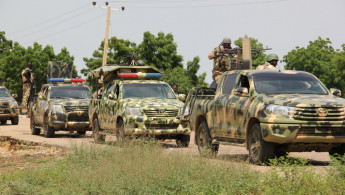Jihadists free 10 hostages in Nigeria: sources
Nigerian jihadists have freed 10 hostages including seven local aid workers, two of them employed by the United Nations, after weeks of mediation, a UN source and a mediation official told AFP Wednesday.
The hostages, abducted between last December and April in the northeast by the Islamic State West Africa Province (ISWAP) were released on Monday after government-backed mediation by a local NGO, the sources said.
ISWAP and rival Boko Haram jihadists periodically free hostages taken during Nigeria's more than decade-long Islamist insurgency in the northeast that has killed around 40,000 people since 2009.
"We succeeded in securing the release of 10 hostages in the custody of ISWAP, including seven humanitarian workers," said Ummu-Kalthum Muhammad, head of Kalthum Foundation for Peace, which facilitated the release.
"It was a result of weeks-long negotiations with the captors," said the head of the Maiduguri-based local charity, which had previously mediated the release of hostages held by ISWAP and Boko Haram jihadists.
Muhammad said the hostages included a World Food Programme (WFP) staffer seized in December last year along with a local staffer for the International Committee of Red Cross (ICRC) and a worker for the United Nations High Commissioner for Refugees (UNHCR) kidnapped in January.
The three were abducted at bogus checkpoints outside the Borno state regional capital Maiduguri.
Muhammad said four humanitarian staff kidnapped in April in the town of Dikwa during an ISWAP raid on a UN hub, as well as a Christian priest, a university teacher and a government worker, were among the other freed hostages.
A source at the UN office in Maiduguri confirmed the release of "some humanitarian workers including UN staff" held by the jihadists.
The two sources did not say if any ransom was paid.
Since it split from mainstream Boko Haram group in 2016, ISWAP has intensified attacks on military targets but has also increasingly been targeting civilians.
The group set up fake checkpoints on highways, abducting civilians and aid workers.
The UN has repeatedly expressed concern over abductions and attacks targeting aid workers in the northeast where 12 humanitarian workers were killed in 2019 alone, twice the fatalities the previous year, according to UN figures.
At least two million have been displaced from their homes by the conflict and aid workers say access to the needy is becoming more complicated because of worsening security and as relief workers are directly targeted.
The violence has spread to neighbouring Niger, Cameroon and Chad, leading to the formation of a regional military force to fight the insurgents.





 Follow the Middle East's top stories in English at The New Arab on Google News
Follow the Middle East's top stories in English at The New Arab on Google News
![Netanyahu furiously denounced the ICC [Getty]](/sites/default/files/styles/image_330x185/public/2024-11/GettyImages-2169352575.jpg?h=199d8c1f&itok=-vRiruf5)
![Both Hamas and the Palestinian Authority welcomed the ICC arrest warrants [Getty]](/sites/default/files/styles/image_330x185/public/2024-11/GettyImages-2178351173.jpg?h=199d8c1f&itok=TV858iVg)
